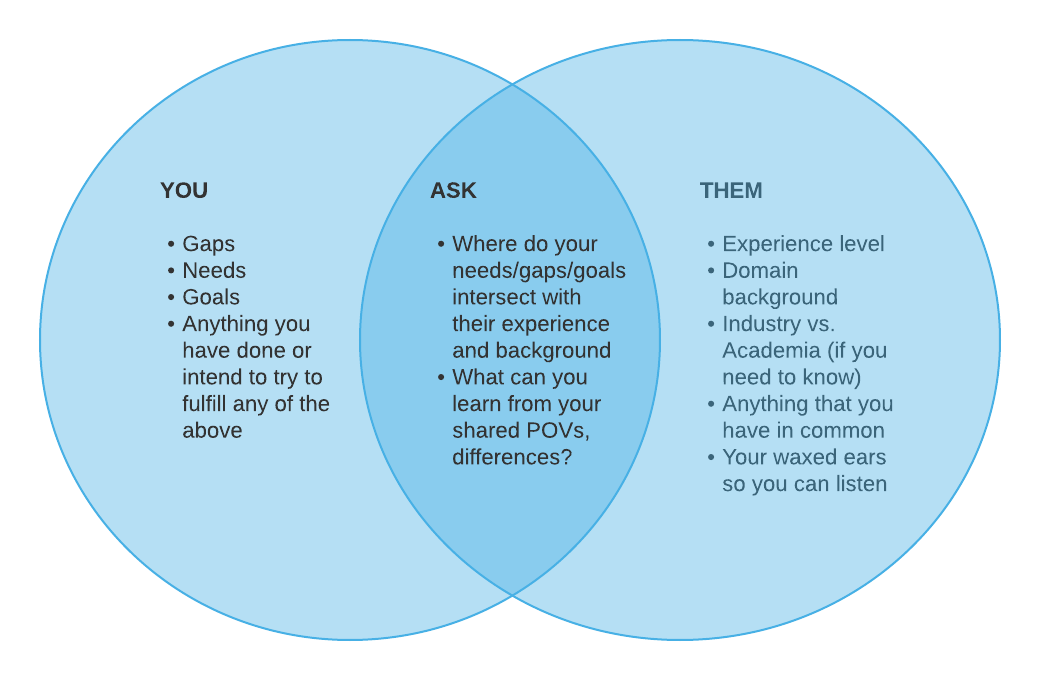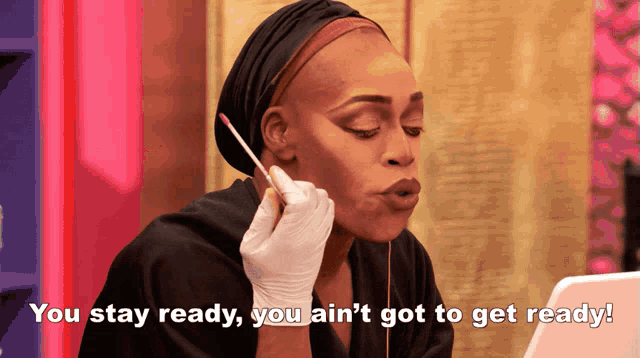A lot of weekend class and work experience has left me at the intersection of being a student and a member of corporate America at the same time (again). Given the slight advantage I have on my fellow students, this has been sitting in my human computer to get out to someone who might need it. Early career workers, post-graduates, and students search for tools and guidance as they go out into the world. Some are lucky enough to find someone willing to give time and resources to help. The challenge comes when no one tells you how to navigate that relationship as a mentee so you can maximize value for both parties involved.
Disclaimer: This worked for me - an able-bodied, Black and African woman who has been exposed to multiple work cultures including African, American, and English. All this to say, you might need to tweak these to fit your life context, but it should give you a good guide to follow.
Pre-work on yourself
Listen to Scar on this one. That’s the only time we might take this brother’s side over Mufasa.
You might say - but that’s why I need a mentor. Well, yes. But they don’t know you yet. More specifically, they don’t know why you want to connect - so start there. Do a gap analysis on yourself. Assess where your next goal is and how far you are from it. If this is for instance how to effectively transition into tech, you might need to know what segments of it interest you e.g. web development, program management, data science etc. Research those things and be prepared to discuss them. It most likely isn’t as straight forward as “Tell me what to do” when you finally get the facetime, so try and think back to why you want to reach out to this person and take them up on their offer to help. What makes this interaction appealing to you?
With each interaction, meeting, or planned learning session you may have with this person, be able to answer this question before minute one. What are the desired and optimal outcomes?
Don’t go in without questions. Even if your question is where do I start?, you will most likely get a follow-up (more on this later) from your potential mentor asking you what do you know so far? - that’s why you need to check yourself before … (you know how it goes ![]() ).
).
… And on them
So, back to the hinted on note above - WHY are you taking this mentorship up? What about them makes it a good fit? It might help to follow this Venn diagram as a basis for your preparation.
If you are meeting with someone in 2021 for a tech mentor, chances are they are on the Google or LinkedIn. I’m not saying be a stalker; just an extension of the preparation above. Ideally, you will be able to fill in the gaps and ask get to know you(r career) questions while already knowing what you hope to work towards and what the person on the other side of the conversation can nourish to that end.
Don’t make the conversation transactional. Great communication will move mountains, and you are talking to a person so go with the flow. Ask follow up questions. Hopefully since you asked for this person’s time, you are genuine and engaged about their story as much as you’d hope they are with yours. And if you don’t feel this is going anywhere, be honest and say thank you.
Like rain, come again another day
This is where the first two things come together. As you learn more and understand what you need to extend your journey, you’ll update your Venn diagram. It will grow limbs and you’ll have sub-plans. Let’s say you are trying to start your journey as a developer and already have a text editor set up. After the first or second conversation with your mentor, you realize HTML and CSS are in your future. You could have two points on sub-plan 1 - to take a tutorial to learn these and then create a project to solidify your ideas. Now the next time you are working through a problem and can’t get through some CSS margins (like we all struggle), you could ask your mentor to describe how they are different from borders and cement that concept for you.
Following up on tangible things is a great way to keep the momentum going. COVID-19, living in the west, and all the shenanigans may need you to take care of your health before your career first and that is OK. Your relationship may evolve so that sometimes you are asking about big picture questions and all of that is good and peachy too. You can always maintain a connection if you keep track of how you are (both) evolving.
A note on mindfulness
We established there are two humans talking and evolving right? As you meet this working professional, be mindful of their time and resources. You may not be the only mentee for this person (I mean if they are great, they probably have many an aspiring techie looking up to them). Some quick tips:
- Before meetings, send a note with a tentative agenda so your meeting is intentional. Remember to use that question (what are the desired and optimal outcomes from this interaction today?)
- Instead of going back and forth on meeting times, set up a Calendly. The point here - you are getting free help, make it as easy and convenient as possible for them - it’s the little things, ya know?
- Say thank you after interactions and follow up on them too! Given you are learning from this person and your mentor may have content you keep going back to, talk to them about it, cheer them on. They are on a journey too!
- Be proactive about your questions’ responses. When you have a question for them, also communicate what you have tried to do to solve it. It shows your range of knowledge and also is a way for your mentor to understand your learning style and problem solving skills.
And a key one on “mentorship”
Please know you don’t need to have one mentor. You can be a community mentee, I consider myself one! It can be such a daunting task when you think you have to find a mentor. Your co-worker, a former or current classmate, a boss - anyone whose intentions you trust for your career path (tech or not) can contribute to your adventure. So if you haven’t found a mentor yet, you can still use these tips to network in the future!
And on that note, good night and good light ![]()



